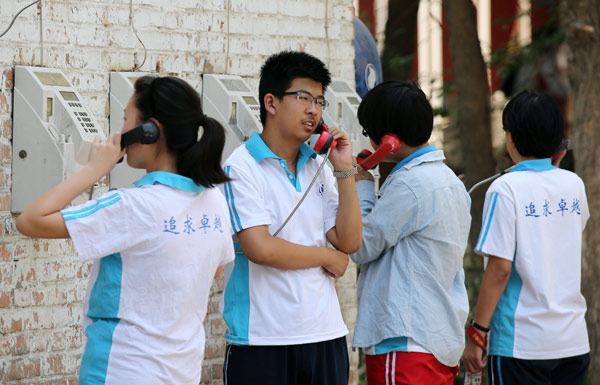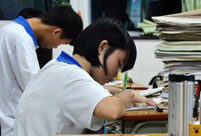 Luoyang aims to become 'Chinese Culture City'
Luoyang aims to become 'Chinese Culture City'
 Century-old jade disc found confirms ancient legend
Century-old jade disc found confirms ancient legend
 A serious mind behind Chinese leader
A serious mind behind Chinese leader
 Panda Cubs to Predict 2014 World Cup Winners
Panda Cubs to Predict 2014 World Cup Winners
 China Southern Airlines flight attendants win titles in service contest
China Southern Airlines flight attendants win titles in service contest
 Pupil's performance art persuades people to stop smoking
Pupil's performance art persuades people to stop smoking
 Nie Chenxi's clay tigers
Nie Chenxi's clay tigers
 Children's Day wishes
Children's Day wishes
 Chinese Kung Fu charms Silicon Valley
Chinese Kung Fu charms Silicon Valley
 Tranquil Yankou ancient town
Tranquil Yankou ancient town

Students at Hengshui High School call their families on Tuesday, four days before the exam. (Photo/China Daily)
'Super high schools'
The phrase "super high schools" has been coined to describe establishments such as Hengshui High. There are similar schools in provinces such as Jiangxi, Anhui, and Hubei, and they not only attract thousands of students who are desperate to attend China's most-prestigious universities, but are also feted by teachers such as Xu who are keen to improve their "teaching quality", factors that usually result in high university entrance rates.
However, some experts believe that the schools' success is a case of cause and effect. "These 'supreme schools' are a direct result of China's college entrance system, which is heavily exam-oriented," said Xiong Bingqi, deputy-president of the 21st Century Education Research Institute.
Xiong said that under the current system, there are three kinds of high school in China: those oriented toward quality of education; those oriented toward exams results; and others that are nominally quality-oriented, but are in reality exam-oriented.
Schools such as Hengshui High are in the third category, according to Xiong, who said very few schools in China would fall into the first category.
"However, criticism yields nothing. It's not the schools that should be blamed, but the system. If the system doesn't change, these 'supreme' high schools will remain unchanged. If Hengshui High didn't follow this model, other schools would," he said.
Under the current system, schools care more about comments from current students and their parents, who attach great importance to the universities their children attend, but often overlook the life and personality training that's important for the students' futures.
"The lack of 'personality education' - a problem in schools all over China - will result in huge problems in the future," according to Xiong, who said few of those who score top marks in the gaokao are successful once they graduate from prestigious universities, and that very few of those who perform well in the exam can be considered "great masters" in the Chinese tradition.
"If the current system doesn't change, there will be no talent to contribute to society in the future, " he said.
Chu Zhaohui, a senior researcher at the National Institute of Education Sciences, echoed Xiong's assessment, saying the gaokao is the reason behind the existence of "super high schools".
"The model employed by high schools such as Hengshui High is an inevitable choice for those disadvantaged by the current college entrance examination system," he said, adding that although many students from less-demanding schools enter prestigious universities, few of them come from poorer families.
"Most students at 'run of the mill' schools are from families on the bottom rung of society, and the gaokao is seen as an opportunity for them to change their destinies. In the short term, the model may help those students, but in the long term, it doesn't work," Chu said.
"Children need pressure to grow up, but that pressure shouldn't be overwhelming. Children require guidance, but should also depend on themselves. Three years is a comparatively short part of a lifetime, and if students can break free of the restrictions imposed by schools such as Hengshui High and start thinking independently again, they can still play a useful role in society."
However, Chu added, "I'm concerned that a large number of them may end up making little real contribution to society and the country, because it's hard to change after three years of being brainwashed."
 |
 Magnificent Hutiao Gorge
Magnificent Hutiao Gorge  Heat waves hit China
Heat waves hit China Love at the construction site
Love at the construction site Graduation photos bring memories back to life
Graduation photos bring memories back to life Art school students present works in Nanjing
Art school students present works in Nanjing Xinjiang's first high-speed railway goes on trial run
Xinjiang's first high-speed railway goes on trial run 3D Sea-life Themed Art Garage unveiled in Zhengzhou
3D Sea-life Themed Art Garage unveiled in Zhengzhou
 Creative Photos go viral during graduation season
Creative Photos go viral during graduation season Students in last-minute effort for Gaokao
Students in last-minute effort for Gaokao Dali, an ideal summer vacation destination
Dali, an ideal summer vacation destination Xichan Temple's little monk hit the Internet
Xichan Temple's little monk hit the Internet Monologue of a modern dancer
Monologue of a modern dancer College girl proposes to boyfriend on Weibo
College girl proposes to boyfriend on Weibo Special operation members in counter-terrorism training
Special operation members in counter-terrorism training American football brings manhood out of boys
American football brings manhood out of boysDay|Week|Month